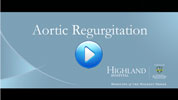Aortic Regurgitation (Insufficiency)
 Aortic regurgitation (insufficiency) is a heart condition affecting one of the heart’s major heart valves, the aortic valve. The aortic valve regulates the flow of blood from the main pumping chamber, the left ventricle, to the major blood vessel, the aorta.
Aortic regurgitation (insufficiency) is a heart condition affecting one of the heart’s major heart valves, the aortic valve. The aortic valve regulates the flow of blood from the main pumping chamber, the left ventricle, to the major blood vessel, the aorta.
When the left ventricle contracts, the aortic valve opens, so blood can flow into the aorta and be delivered to your body’s organs and tissues. The aortic valve then closes, keeping blood from flowing back into the left ventricle.
In aortic insufficiency, the aortic valve does not close normally. This causes blood to leak back into the left ventricle. Over time, this leakage can cause the left ventricle to enlarge and weaken.
Symptoms
-
In most instances, patients do not have symptoms. Aortic insufficiency is usually detected when your doctor hears a murmur, or abnormal sound originating from your heart.
-
Most common symptoms are usually shortness of breath, especially with activity.
-
Other symptoms might include palpitations, a feeling that your heart is pounding, or chest pain.
Diagnostic Tests
After a careful physical examination, your doctor may order additional tests.
Treatment
Treatment depends on your symptoms, the amount of regurgitation (or leakage) back into your heart, and the function of the heart muscle.
-
People with mild regurgitation and normal heart muscle function generally do not require treatment. Your doctor will recommend follow-up visits to monitor your condition. Your doctor may prescribe medications to help reduce the amount of leakage and lower your blood pressure, if elevated.
-
In people with severe leakage who are experiencing symptoms, surgery to replace the aortic valve is sometimes recommended.
Print this information
For Additional Information